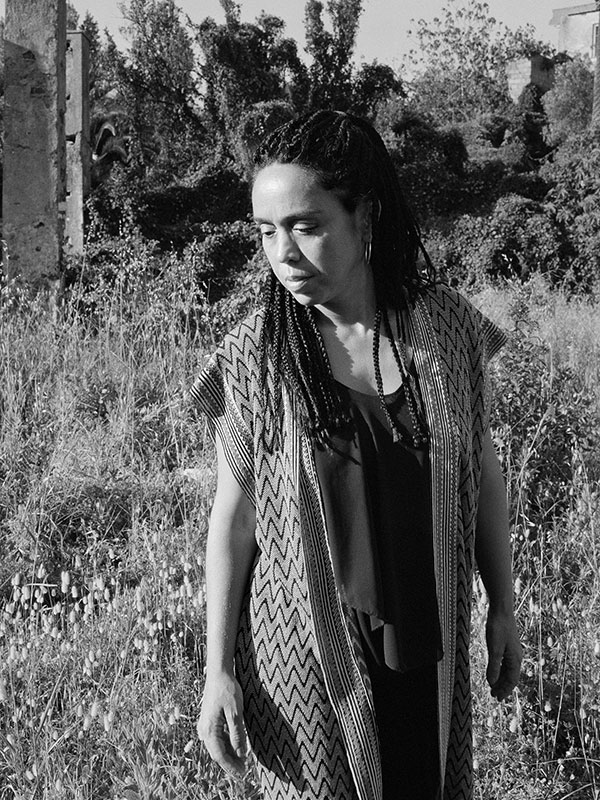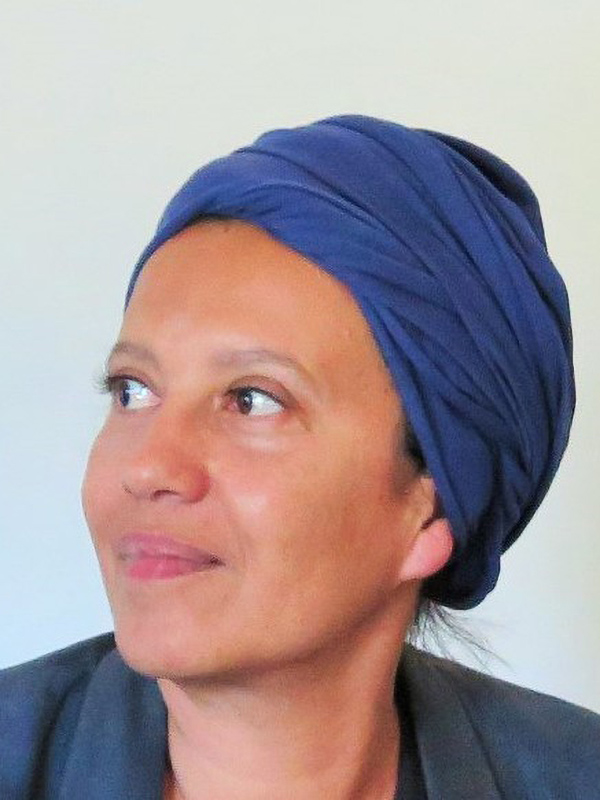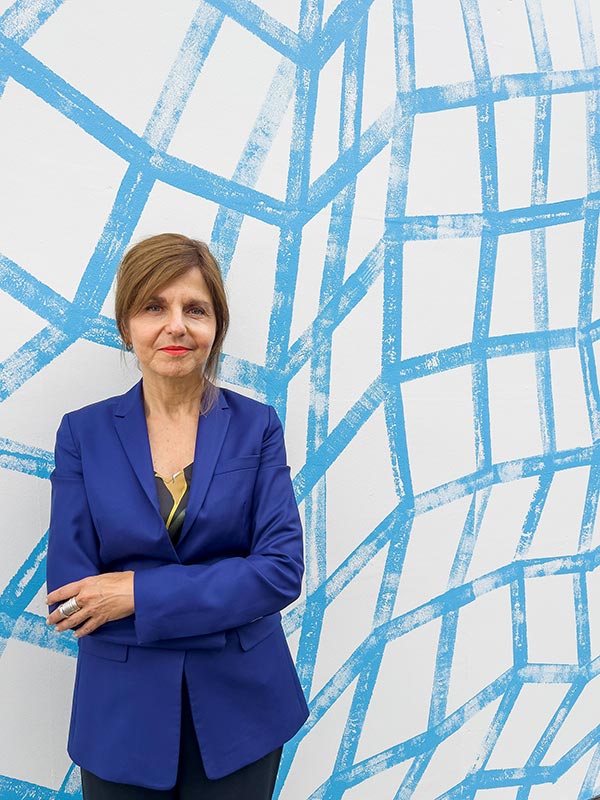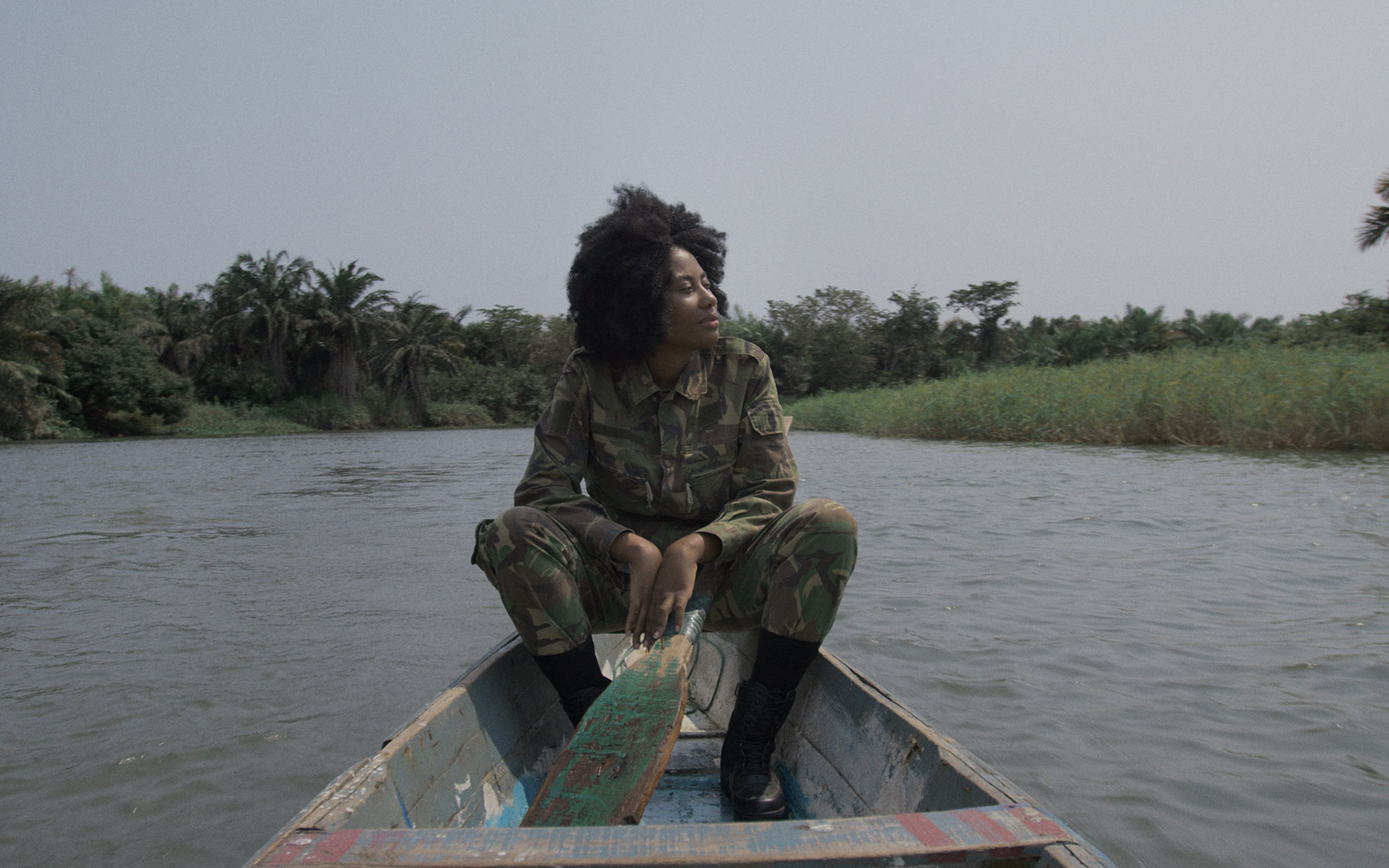'Path to the Stars' by Mónica de Miranda
Event Slider
Date
- / Cancelled / Sold out
Location
Room 1Calouste Gulbenkian Foundation
On the occasion of the public Portuguese première of Mónica de Miranda’s film, Path to the Stars (2022), at the Calouste Gulbenkian Foundation, the Modern Art Centre is organising a discussion between the artist, the researcher and cultural critic Ana Cristina Pereira (AKA Kitty Furtado) and the curator Gabriela Salgado, current director of The Showroom, a contemporary art space in London. The book no longer with the memory but with its future will be launched after the event, with a signing session by Mónica de Miranda.
The film, the title of which alludes to the poem O Caminho das Estrelas [Path to the Stars] by Agostinho Neto, leader of the anti-colonial movement and first President of Angola following independence, narrates the journey of an ex-combatant in the Angolan liberation struggle as he travels, from dawn to dusk, by boat along the river Kwanza, the birthplace of the Ndongo kingdom, a pre-colonial African tributary state of the kingdom of Kongo. A metaphor for a female space that crosses several times and spaces, a serene-looking woman attentively watches the nature that surrounds her, as her body slowly merges with the flowing water of the river.
The film was presented in the exhibition no longer with the memory but with its future, at the Oratorio di San Ludovico, between 20 April and 29 May 2022, as part of the 59th Venice Art Biennale (parallel programme), curated by Paula Nascimento and supported by the Calouste Gulbenkian Foundation. The film was also screened at the 12th Berlin Biennale, between 11 June and 18 September 2022. It was recently acquired for the CAM Collection.
PROGRAMME
18:00 / Film presentation
18:05 / Film projection
Path to the Stars, 2022, HD Video, Colour, 34’41”
Mónica de Miranda
The film Path to the Stars follows the journey of a heroine confronted by her own shadow, by different temporalities and micro-narratives. It proposes a counter-narrative composed of complex biographies that overlap and interact from the anticolonial freedom fighters of the past, and the uncertainty of the present, the desire to belong to the projection of a future where our symbiosis with nature is recuperated.
The film follows the journey, from dawn to dusk, of an ex-combatant of the Angolan struggle for liberation as she travels by boat past the banks of the Kwanza River, the birthplace of the Ndongo kingdom, a pre-colonial African tributary state of the Kongo kingdom, created by sub-groups of the Ambundu, and led by King Ngola. A metaphor of a female place that threads through various times and spaces, a serene-faced woman intently observes the nature that surrounds her, while her body slowly merges with the watery currents of the river. Various characters appear throughout this journey: a shadow, an old woman and a child, soldiers who try to read their future in the lines of an astral map of Angola, and an astronaut, all of whom spin their stories in the murmur of the river.
18:40 / Talk
Gabriela Salgado
Kitty Furtado
Mónica de Miranda
Moderation: Rita Fabiana
19:20 / Q&A
CREDITS
Director: Mónica de Miranda
Screenplay: Mónica de Miranda e Yara Nakahanda Monteiro
Production: Geração 80, Jahmek Contemporary Art, Studio Mónica de Miranda
Producer: Jorge Cohen
Music: Xullaji
Cast: Renata Torres, Sunny Dilage, Maria Manuel, Raul de Rosário, Orlando Sérgio, Sandy Manuel, Elaine Costa, André Eiuba, Eugenia Diogo Bernardo, Fernanda Daniela Francisco Afonso, Francisca Francisco Cassua
Support: Materia, FCT-Fundação para Ciência e Tecnologia, Hangar - Centro de Investigação Artística, Fundação Calouste Gulbenkian
BIOGRAPHIES

Mónica de Miranda is an artist and researcher. Her work is based on themes of urban archaeology and personal geographies. She works across various disciplines, including drawing, installation, film, video and sound, in their expanded forms and on the borderline between fiction and documentary. She graduated in Visual Arts from Camberwell College of Arts. In 2014, she set up HANGAR – Artistic Research Centre, in Lisbon.
Her most important exhibitions include: Construir o Tempo (Centro Cultural Camões, Luanda, Angola, 2022), Mirages and Deep Time (Galeria Avenida da Índia, Lisbon 2022), Berlin Biennale (2022); no longer with the memory but with its future (Oratorio di San Ludovico de Nuova Icona, Venice Biennale, Italy 2022), The Island (Autograph, London, 2022), Europa Oxalá (Calouste Gulbenkian Foundation, Lisbon; Mucem, France, 2022), Thinking about possible futures (Biennale del Sur, 2021), African Cosmologies (Houston Fotofest, 2020), Tales from the water margins (Biennale Internationale de l'Art Contemporain de Casablanca, 2018), Taxidermy of the future (Lubumbashi Biennale, Congo, 2019), Atlântico. Uma viagem ao centro da terra (Galería Sabrina Amrani, Madrid, 2017), Panorama (Tyburn Gallery, London, 2017), Arte Contemporânea Africana e Estética das Traduções (Dakar Biennale, Senegal, 2016), Addis Foto Fest (Addis Ababa, Ethiopia, 2016), Hotel Globo (Museu Nacional de Arte Contemporânea do Chiado, Lisbon, 2015), Ilha de São Jorge (14th Venice Architecture Biennale, Italy, 2014), Line Trap (São Tomé and Príncipe Biennial, 2013);
In 2019, she was nominated for the EDP Foundation New Artists Award at Museu Maat and in 2016 was shortlisted for the Novo Banco Photo Prize and exhibited at the Museu Coleção Berardo as a finalist.
Her work is represented in various public and private collections, including: CAM Collection, MNAC, MAAT, FAS, Centro Cultural de Lagos and Arquivo Fotográfico de Lisboa.

Ana Cristina Pereira (AKA Kitty Furtado) is a cultural critic dedicated to breaking down the boundaries between academia and the public sphere. She has curated exhibitions of (post)colonial cinema and promoted public discussion around (In)Visibilities and Racism. She has actively participated in the debate on restitution/reparation at European level, particularly in Germany, working with Paradise Gardens Productions, in the context of Restitutions Art-Lab, in Berlin.
She gained a doctorate in Cultural Studies from the University of Minho with the thesis: ‘Otherness and identity in cinematographic fiction in Portugal and Mozambique.’ She is an associate researcher at CECS (U. of Minho), where she is involved with the CulturesPast&Present project and the Museu Virtual da Lusófonia, and is also research coordinator in the area of ‘Migrant Activisms,’ part of the MigraMediaActs project. She carried out her post-doctoral research at CES (U. of Coimbra) as a member of the (De)Othering project (2020-2022) and the project: ‘À Margem do Cinema Português: Um estudo sobre o cinema afrodescendente produzido em Portugal’ (On the Margin of Portuguese Cinema: A study on afro-descendant cinema produced in Portugal, 2018-2020).
She has published articles in national and international scientific magazines, as well as sections in books, and is the co-author of the book Abrir os gomos do tempo: conversas sobre cinema em Moçambique (Opening up the buds of time: conversations on film in Mozambique, 2022). She has co-edited special editions of scientific magazines and is deputy editor of VISTA: a visual culture magazine.

Gabriela Salgado is an Argentine-born curator based in London and working internationally. Gabriela gained a Curating Contemporary Art Master’s degree from the Royal College of Art, and since 1997 she has curated a large number of exhibitions and has lectured in over twenty countries. She specialized in Latin American art as curator of the Latin American Art Collection at Essex University, UECLAA (1999-2005) and was curator of Public Programmes at Tate Modern (2006-2011). She curated La Otra Bienal in Bogotá, Colombia (2013) and the 2nd Biennale of Thessaloniki, Greece (2009) and acted as jury member for the Prince Claus Awards and Videobrasil Festival. She created 'Transatlantic Connections' a programme of exchanges for African and Latin American artists (2011-2016).
Between 2017 and 2020 she worked as Artistic Director of Te Tuhi Contemporary Art in Auckland, Aotearoa NZ, and in 2022 became director of The Showroom in London.
The Calouste Gulbenkian Foundation reserves the right to collect and keep records of images, sounds and voice for the diffusion and preservation of the memory of its cultural and artistic activity. For further information, please contact us through the Information Request form.
